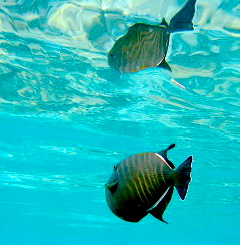Waves of struggle could form stronger swimmers
 A new study has assessed how difficult it is for fish to swim through large waves, and it turns out that many have little choice but to go with the flow.
A new study has assessed how difficult it is for fish to swim through large waves, and it turns out that many have little choice but to go with the flow.
Researchers from the Australian National University (ANU) have found big waves are energetically costly for fish, but they may just be able to adapt.
As climatic conditions shift worldwide, there is a high likelihood that many fish habitats will be inundated with more frequent and larger waves.
The study used a computer to control the flow of water in an experimental chamber, in order to replicate the oscillations of the open ocean. Researchers were specifically focussed on fish that swim with their arm, or pectoral fins, which are more common on rocky and coral reefs.
ANU researchers Dominique Roche and Sandra Binning found that it is much more energetically-demanding for fish to deal with large fluctuations in water speed and wave height.
“It’s harder to constantly switch speeds than it is to remain at a constant speed, like a runner changing between running and walking during interval training versus a steady jog. Well, it’s the same for swimming fish,” Mr Roche said.
“Things could get tough for fish in windy, exposed habitats if waves get stronger with changing climate. But there may be a silver lining,” Ms Binning said.
The team believes the behaviour of some specimens could come to dominate populations, if conditions continue as they are.
“In the swim chamber, when the water flow increased, fish had to beat their fins faster to keep up. But when the water flow slowed down, some fish took advantage and rode the wave,” Binning said.
“Essentially, rather than beating their fins frantically, these fish used the momentum that they had gained while speeding up to glide and save energy.”
“This means that some individuals are better at dealing with waves than others, and that there is hope for populations to adapt their swimming behaviour to potentially changing conditions in the future,” Mr Roche concluded.
Their report has been published in the latest edition of the Journal of Experimental Biology.








 Print
Print